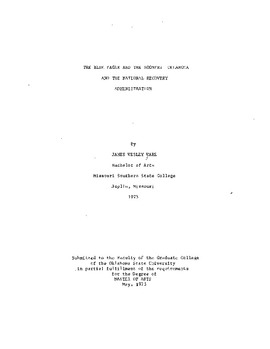| dc.description.abstract | Franklin D. Roosevelt and the New Deal have been the subjects of hundreds of works. Historians such as Arthur M. Sthlesinger, Jr., James MacGregor Burns, and William Leuchtenberg, have argued that theman and his program were liberal, while Paul Conkin, Barton J. Bernstein, and Howard Zinn have countered with the assertion that they were conservative. However, there has been no major effort to study these two primary themes as they related to the New Deal's administrative agencies, especially that of the National Recovery Administration. In addition, scholars have written little regarding the organization and influence of these agencies at the state level. If conservatism is defined as supporting and promoting the causes of special interest elites such as big business over those of the public or larger, broader based organizations, then the New Deal and the NRA must be classified as conservative. The recovery agency achieved short-term conservative ends, and the alliance between business and government has had long range conservative effects on American econbmics and politics. This thesis is a study bf the Natibnal Recovery Administration at both the national level and within the state of Oklahoma. It i:s a study of the men who created the NRA, how it "functioned, and who benefited. The primary purpose of this study is to determine the influence business groups, such as the Chamber of Commerce and the American Petroleum Institute, had on the development and operation of the NRA. To complete the story of the Blue Eagle it has been necessary to describe the creation of the recovery program and the codes of fair competition, the development of the NRA's local, state and national organizational structure, and the effects and reaction that various interest groups had on these bodies. For this work I have investigated Congressional debates and hearings concerning the establishment and extension of the NRA, studied the NRA records available in the Oklahoma State University library, and Oklahoma City's Chamber of Commerce, and examined state and national newspapers for reaction to the Blue Eagle and its effects on the economic and political structure. In addition, I have considered biographies and autobiographies of the participants, and general histories of the New Deal and Oklahoma. | |
